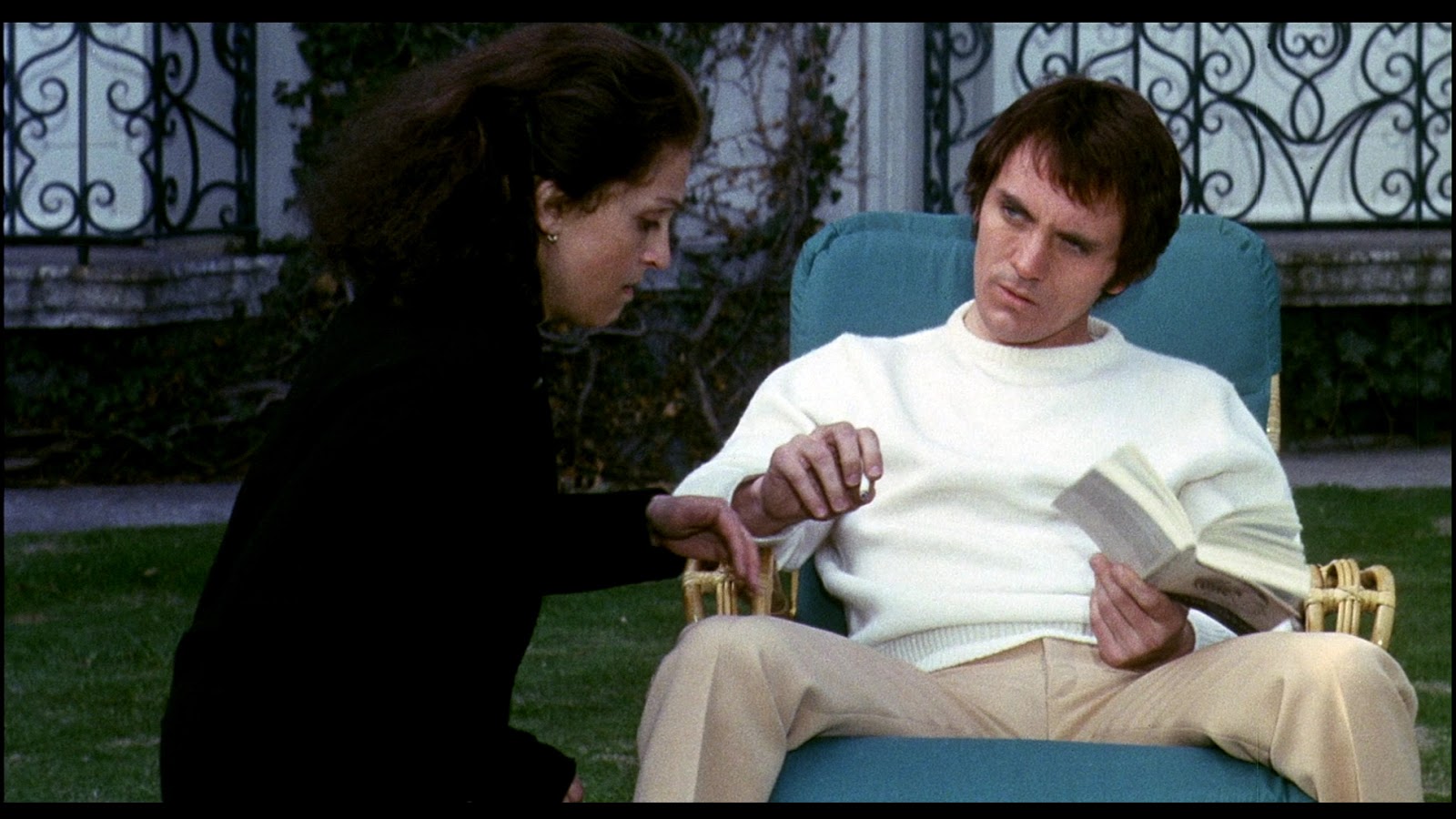Evil knocking on the door: Home Invasion x5
Home as a safe place, bearer of the most intimate secrets, is often tainted in cinema. The allure of the home invasion subgenre lies in the subversive ethics of the intruder, an external element meant to disturb the owners’ domestic ecosystem. If the most typical movies demonize the other‘s presence and exploit otherness, some immersions in the other‘s life have more complex motivations than simply giving a fright and rather carry social, spiritual and psychological implications strongly anchored in the captive hosts themselves.
Teorema (dir. Pier Paolo Pasolini, 1968)

Teorema is a disturbing home invasion film, which falls within Pasolini’s Marxist ideology, seeking to dismantle the Italian bourgeois society and restore the dignity of the proletariat. The premise of the film is simple: an unknown individual spends a few days in the house of a wealthy family, prompting changes and revelations in every member of the household. After his sudden departure, each of the characters who came in contact with him is hit by a deep emotional void. One by one, all the characters engage in some sort of sexual affair with the strange visitor played by Terence Stamp, an event that triggers their inner transformation. What scandalizes the Catholic Church at the time is the protagonist’s portrayal as a divine entity that promotes the immorality of sexual desire and even turns it into a spiritual trigger in a heteronormative and chaste society, conditioned by Christian morality. Face to face with the revelation that they have lived a meaningless life, the family members step into an unhealthy addictive relationship with the guest, who casts them in a state of disarray after his sudden leaving. Contrary to the usual development, where the focus falls on the household being torn apart, once the intruder leaves the scene, each of the characters sets off on their own path outside the mansion, which is emptied of meaning as a hint toward the dissolution of the family.
Borgman (dir. Alex van Warmerdam, 2013)

The Dutch director alternates between drama, supernatural thriller and comedy to develop a psychological analysis of human fear, cruelty and perversity, without forgetting the effectiveness of manipulation, hypnotic seduction and the supremacy of vice over virtue. According to Warmerdam, the evil that enters the house invaded by the mysterious character is of one’s own making, due to leading an irresponsible and self-centered life. The opening scene sets the supernatural tone of the protagonist Camiel Borgman’s mission, who asks for shelter from a bourgeois family living in the perfect house, an allegory of the primordial couple expelled from the Garden of Eden. With obvious ties to Angeology (i.e. the theological doctrine of angels or its study), Camiel recruits followers from among children, physically marking them as an innocent lineage, which can still be saved. Filled with religious symbols, references to art history and Germanic mythology, Borgman is a fable of symbolic socialism in which the besieged family falls prey to an odd act of collective hypnosis, unaware of their condition. If at the beginning of the film the protagonist is chased as if in a witch hunt, by a Catholic priest among others, and lives in an underground hideout, the strange night rituals to which he subjects his hosts, lying naked over them while they’re sleeping, bring to mind the image of the incubus. Although the hermeticism of the absurd universe and the transcendence of the psychological manipulation remind of Lanthimos’s Canine (2009), while the speech makes one think about Luis Buñuel’s Viridiana, Warmerdam’s extravagant universe is rather an incarnation of Bulgakov’s The Master and Margarita, where devils take different shapes and are rather seen as catalysts of suffering and less as its manifestation.
3-Iron (dir. Kim Ki-duk, 2004)

Taking an unexpected form for a home invasion movie, 3-Iron draws a bizarre relationship between host and invader and explores the ways of the genre by merging with romantic drama, the transition from one registry to another being navigated with the delicacy specific to the South Korean director. Almost devoid of dialogue, 3-Iron stars an atypical version of the intruder; Tae-Seok is a young drifter who breaks almost imperceptibly into houses whose owners are on vacation and does small household tasks in return. Without causing any damage, most of his gestures can pass for an affectionate invasion of privacy and personal space, despite the fact that he is skilled enough to keep a low profile. Kim Ki-duk offers no answers, and thus 3-Iron continues his tradition of creating borderline, almost pathological characters who move gracefully through carefully constructed settings. The change of registry is initiated by the very plot of the film, an atypical “girl meets boy”, when a housewife, miserable in her own home and marriage, catches sight of the intruder and decides to follow the same nomadic lifestyle. The sense of balance and symmetry betrays a Buddhist influence – for every act of emancipation conducted by the characters, there is a setback, and every moment when she needs him is replicated in the mirror by a scene in which the roles are reversed. As he loses his corporality, becoming an almost spectral presence in the vein of magic realism, she claims autonomy and regains her voice. Contrary to Borgman’s imperceptibly evil presence, Tae-Seok is more of a guardian angel, restoring the domestic balance the marital home lacked before.
Parasite (dir. Bong Joon-ho, 2019)

At the opposite pole, the 2019 Palme d’Or winner depicts an infiltration motivated by resentment towards financial inequity and the exclusion of the socially inferior. The four members of the Kim family are brazenly sneaking into the lives of the wealthy Park family, making themselves indispensable after creating and/or exploiting several false needs. From posing as a student who also works as an English tutor to orchestrating some crafty occupation schemes, there is nothing supernatural about the Kims’ coup, which rather depends on their manipulative skills. The source of comedy derives from the fact that it is directly proportional to the snobbery and naivety of the South Korean bourgeoisie represented by Mrs. Park, who admits that the maid knows her house better than she does. The statement couldn’t prove more accurate when the existence of an underground bunker, unknown to the homeowners, is revealed; Bong Joon-ho meticulously develops the symbolic function of architecture. Based on the top-down, high-low duality, the premise of invasion doesn’t pass as violent (although it will become violent when the situation demands it) but is rather animated by the cruelty of capitalism surrounding us. Although the outlook generally shows solidarity with the oppressed, no matter how far the Kims’ scam goes, Parasite doesn’t justify the farce but suggests that their family, like a tick that sucks the blood of the host, is just as motivated in the desire for social ascension even when they must tread on the corpses of those like them.
The Servant (dir. Joseph Losey, 1963)

Before Parasite was The Servant, a social-themed home invasion classic and the result of the collaboration between Losey and Nobel Prize winner British playwright Harold Pinter. The house where Hugo Barrett (Dirk Bogarde) settles in is a spiral trap that devours master Tony (James Fox) through a perpetual redefinition of areas of influence and power games, which leads to the reverse of the initial situation between the butler and the nobleman. A constant in Losey’s cinema, the characters who are hell-bent on subtly undermining others fit into the Hegelian master-servant dialectic, reversing the relations of subordination. The scene on the staircase transforms visually and metaphorically into a battlefield for social ascension, leading to the exchange of roles between Hugo and Tony and the disintegration of one’s personality in favor of the other. With the help of lighting, the shadows cast on the walls and the dialogues where each line governs a move towards dominating the other, Hugo initiates the game starting from the bottom of the stairs to finally ascend to its top, triumphing over Tony by ordering him a glass of brandy. The ideal home, the household, is turned by the presence of the intruder into a house arrest-type living, an analogy visually supported by the winding staircase, an image coined by the master of suspense in Psycho (dir. Alfred Hitchcock, 1960). But unlike the home invasion classics that rely on a slow build-up, The Servant gives a new dimension to the genre; Barrett disposes of the other on account of a persistent complicity based on intimidation, the two playing socially interdependent roles.
Film critic and programmer, she collaborates with various international film festivals. Her writing has appeared in publications such as Senses of Cinema, Kinoscope, Indiewire, Film Comment, Vague Visages and Desistfilm. In Spanish she has written for Caimán Cuadernos de Cine and in Romanian she collaborates with FILM magazine. Programmer and coordinator of Tenerife Shorts.
